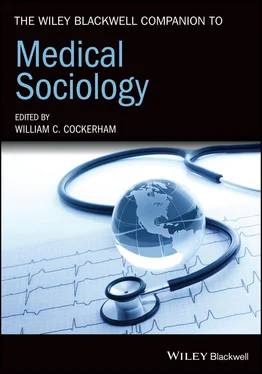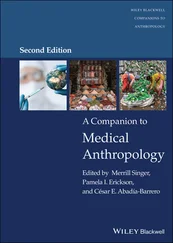In Part IV, the emphasis is on health and various types of social relationships. Chapter 17 is on health and family, which is a new but highly significant topic for this volume. It is written by Mieke Thomeer and Kirsten Ostergren Clark of the University of Alabama at Birmingham. Thomeer is Deputy Editor of the Journal of Marriage and Family , on the editorial board of the Journal of Health and Social Behavior , and is Teaching Committee Chair for the American Sociological Association’s Medical Sociology Section. Chapter 18 is an updated chapter on health and religion by the well-known scholar Ellen Idler (Emory University). She is the Samuel Candler Dobbs Professor of Sociology at Emory and Director of the Religion and Public Health Collaborative. She also is a Fellow and past chair of the Behavioral and Social Sciences Section of the Gerontological Society of America and the American Sociological Association’s Section on Aging and the Life Course.
Next is a chapter (Chapter 19) on health and migration by a new scholar Elyas Bakhtiari (College of William & Mary) that investigates the increasingly important topic of the health of migrants by an expert on this topic. The section concludes with a chapter on another new subject for this volume, that of mental health, by Teresa Scheid (University of North Carolina-Charlotte). She is a well-known researcher in the sociology of mental health and a senior editor with Eric Wright of the third edition of the Handbook for the Study of Mental Health: Social Contexts, Theories, and Systems .
Part V contains two chapters on health and disease. One is by Barrett on emerging infectious diseases described earlier in this preface for its emphasis on COVID-19 and the other (Chapter 22) by Alexandra C. H. Nowakowski (Florida State University College of Medicine) is on chronic illness. As someone who has experienced a chronic illness over her life course, Nowakowski brings an insightful and personal view to this chapter.
The final section is Part VI on health care delivery. It begins with a chapter by rising scholars Jason Adam Wasserman (Oakland University Beaumont School of Medicine) and Brian Hinote (Middle Tennessee State University) on health professions and occupations. Hinote and Wasserman are co-authors of Social and Behavioral Science for Health Professionals . Another rising scholar is Hyeyoung Oh Nelson (University of Colorado-Denver), who analyzes the doctor-patient relationship in Chapter 24. Eeva Sointu (York St. John University, UK), who has extensively researched complementary and alternative forms of medicine, provides a chapter (Chapter 25) on that topic.
Part VI concludes with chapters on the health care systems of the US, the UK, and China – three important countries in health affairs. Chapter 26 is by Bernice Pescosolido (Indiana University) and Carol Boyer (Rutgers University), who contribute a chapter on the American health care delivery system. The chapter explores the current vortex of health care reforms, problems of access, and costs pertinent to the ongoing legal, legislative, and political disputes taking place in American society. Pescosolido is Distinguished and Chancellor’s Professor of Sociology at Indiana University and Founding Director of the Indiana Consortium for Mental Health Services Research (ICMHSR). She has served as Vice President of the American Sociological Association, received several awards in sociology and public health, and elected to the National Academy of Medicine. Boyer has had a distinguished career at Rutgers where she is former Associate Director of the Institute for Health, Health Care Policy and Aging Research, and a well-known medical sociologist.
Chapter 27 on the British health care system by Jonathan Gabe (Royal Holloway, University of London, UK) is next, and he brings us up-to-date on that country’s national health service and health issues. A noted scholar, he is a former editor of the journal Sociology of Health & Illness , past chair of the European Sociological Association’s Research Network on the Sociology of Health and Illness, past president of the International Sociological Association’s Research Committee on Health Sociology, and a Fellow of the Academy of Social Sciences in the UK. The book concludes with Chapter 28 on the Chinese health care delivery system by Lei Jin and Chenyu Ye of the Chinese University of Hong Kong. This chapter was written in difficult circumstances as Hong Kong was undergoing political protests at the time, and the Chinese University’s campus was closed because of COVID-19. Nonetheless, they contribute an excellent chapter on China, including efforts to cope with the pandemic.
Finally, I would like to thank the efforts of several people at Wiley Blackwell in Oxford who had an important role in the development and publication of this book. These include Justin Vaughan, Charlie Hamlyn, Richard Samson, Merryl Le Roux, and Clelia Petracca. Katie McIntyre at Birmingham-Southern College worked on the index. The first volume of this book originated in a conversation with Justin in a bar in New York City one warm and pleasant afternoon during a long-ago American Sociological Association meeting. This version continues the venture. And thanks again to my wife, Cynthia, for her loving support.
William C. Cockerham
Williamsburg, Virginia
Part I Introduction
1 Medical Sociology and Its Changing Subfields
TERRENCE D. HILL, WILLIAM C. COCKERHAM, JANE D. MCLEOD, AND FREDERIC W. HAFFERTY
The sociological study of health, illness, and healing systems in the US has expanded substantively and deepened theoretically over the past half century. While work in this area once fit under the single moniker of “Medical Sociology,” we now use a range of alternative labels (e.g. Sociology of Medicine, Sociology of Health and Illness, Sociology of Health, Illness, and Healing, Sociology of Health, Health Sociology) and definitions to describe the field. Some definitions highlight topic areas:
“Medical sociology is the study of health care as it is institutionalized in a society, and of health, or illness, and its relationship to social factors” (Ruderman 1981: 927).
“The sociology of health and illness studies such issues as how social and cultural factors influence health and people’s perceptions of health and healing, and how healing is done in different societies” (Freund et al. 2003: 2)
“Medical sociology focuses on the social causes and consequences of health and illness” (Cockerham 2017: 4).
Others emphasize different aspects of the sociological perspective:
“Medical Sociology is the subfield which applies the perspectives, conceptualizations, theories, and methodologies of sociology to phenomena having to do with human health and disease. As a specialization, medical sociology encompasses a body of knowledge which places health and disease in a social, cultural, and behavioral context” (Committee on Certification in Medical Sociology 1986).
“The most important tasks of medical sociology are to demonstrate and emphasize the important influence of cultural, social-structural, and institutional forces on health, healing, and illness…” (Weiss and Lonnquist 2016: 11).
“An approach that emphasizes using the area of health, illness, and health care to answer research questions of interest to sociologists in general. This approach often requires researchers to raise questions that could challenge medical views of the world and power relationships within the health care world” (Weitz 2017: 346).
The many labels and definitions that have been offered suggest a lack of consensus on defining medical sociology’s substantive scope and its most significant contributions to knowledge. Some suggest that it is “hard to find a comprehensible statement of what… medical sociology is” (Chaiklin 2011: 585). Others describe the field as a “loosely connected network of disparate subgroups” (Veenstra 2002: 748). This state of the field raises several fundamental questions. How can we characterize our field in a general and consistent manner? What are our contemporary disciplinary boundaries? What are our major subfields? In other words, who are we now, and what do we do?
Читать дальше












